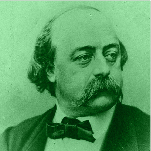Gustave Flaubert was born on 12
th December 1821. He was an influential French writer widely considered one of the greatest novelists in Western literature. He is known especially for his first published novel,
Madame Bovary (1857), for his various (often insightful and amusing)
Correspondence and for his scrupulous devotion to style and aesthetics. The celebrated short story writer Maupassant was also a protégé of Flaubert.
Flaubert was born in Rouen, a town in Upper Normandy, France and was the second son of Anne Justine Caroline (1793-1872) and Achille Cléophas Flaubert (1784-1876), a surgeon. He began writing at an early age, as early as eight according to some sources. Flaubert spent his early education at the Lycée Pierre Corneille, leaving in 1840 to study law in Paris. He was not immediately fond of Paris however, and was an indifferent student, finding the city distasteful. Flaubert did make a few acquaintances at this time, including Victor Hugo, Émile Zola and Jules de Goncourt. Towards the end of 1840 he travelled in the Pyrenees and Corsica, but suffering an attack of epilepsy in 1846, left Paris for good and abandoned studying Law.
Flaubert never married and according to his biographer Émile Faguet, and his affair with poet Louise Colet was his only serious romantic relationship. He travelled widely, however, spending short amounts of time in the Middle East, Greece, Egypt, Beirut (where he contracted syphilis), Istanbul and Carthage – all between 1849 and 1858. Flaubert was very open about his sexual activities with prostitutes in his writings on his travels. He suspected that a chancre on his penis was ‘from a Maronite or a Turkish girl.’ He also engaged in intercourse with male prostitutes in Beirut and Egypt; in one of his letters, he describes a ‘pockmarked young rascal wearing a white turban.’
Flaubert’s first literary work was
November, a novella completed in 1841. Not all of his early works were successful, as a rather amusing anecdote about
The Temptation of Saint Anthony reveals. In 1849 he read the novel aloud to Louis Bouilhet and Maxime Du Camp over the course of four days, not allowing them to interrupt or give any opinions. At the end of the reading, his friends told him to throw the manuscript in the fire, suggesting instead that he focus on day-to-day life rather than fantastic subjects. This all changed the following year, however. In 1850, after returning from Egypt, Flaubert began work on
Madame Bovary. The novel, which took five years to write, was serialized in the
Revue de Paris in 1856. The government brought an action against the publisher and author on the charge of immorality, which was heard during the following year, but both were acquitted. This only furthered the text’s notoriety. When
Madame Bovary appeared in book form, it was well-received. Flaubert’s scrupulously truthful portraiture of life has since been admired by figures as diverse as Michel Foucault, Roland Barthes, Jean-Paul Satre and Franz Kafka. After this success Flaubert went on to write
Salammbô (completed in 1862 after four years of work) and later, drawing on his youth, he wrote
L’Éducation sentimentale (
Sentimental Education), an effort that took seven years. This was his last complete novel, published in 1869.
The 1870s were a difficult time for Flaubert. Prussian soldiers occupied his house during the War of 1870 and his mother died in 1872. After her death, he fell into financial difficulty due to business failures on the part of his niece’s husband and suffered greatly from venereal diseases which had troubled him most of his life. His health gradually declined and Flaubert died at Croisset of a cerebral haemorrhage in 1880 at the age of fifty-eight. He was buried in the family vault in the cemetery of Rouen. A monument to him by Henri Chapu was unveiled at the museum of Rouen.


